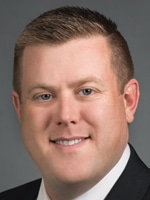In addition to inquiring about symptoms, the chatbot takes into account risk factors such as where people work and their living arrangements to determine their level of exposure to the SARS-CoV-2 virus. Using this information, the Buoy platform directs people to testing locations based on zip code and symptom severity.
In March, Buoy Health contracted with the state of Massachusetts to provide this functionality to the commonwealth’s nearly 7 million residents via the state government website. Under the company’s arrangement with the commonwealth, the platform dynamically updates hospital and test center capacity, says Wilson, “so we can guide patients to areas where there are resources to support them right now.” At CAP TODAY press time, the state of Virginia was planning to go live with the technology as well, using it as a symptom checker and care triage tool. “The major difference is we’re not providing hospital and test center capacity numbers for Virginia, like we are in Massachusetts,” she says.
LifeLink, too, is tackling the COVID-19 crisis. When the pandemic struck, the company was working with Memorial Health System, headquartered in Springfield, Ill., to implement a bot that would handle aspects of referral management in lieu of hospital personnel. But when the magnitude of the crisis became clear, the health care system pivoted, implementing LifeLink’s COVID-19 solution instead and putting its original plans for a referral-management bot on the back burner. The COVID-19 bot takes users through a CDC guidelines-based risk assessment and triages them to one of three levels of care. Working at breakneck speed, LifeLink and Memorial Health completed the implementation in just over three days in mid-March.“What was really important for us was that our end state [what happens after a patient completes the risk assessment] be embedded within the structures and processes,” says Jay Roszhart, president of Memorial Health System Ambulatory Group.

Roszhart
Roszhart noted that the bot has eased the burden on in-house staff by about 20 to 25 percent, in part by addressing “the vast majority of the worried well who are just looking for information.” By mid-May, the tool had handled about 2,200 of the approximately 9,000 encounters directed to the health system’s dedicated COVID-19 respiratory clinics. Staff are following up on the outcomes of symptomatic patients with risk factors, Roszhart says, but the digital assistant could address follow-up care very easily with the appropriate EHR integration.
Bots, in general, “are a dime a dozen,” Roszhart continues. “But finding a vendor that’s willing to partner with you to integrate the bot as part of your workflow is really important.” Building a relationship with LifeLink is helping Memorial Health keep its bot updated as new information about COVID-19 becomes available. “Any time we identify an update or the need for a change in the language or behavior of the bot, since we understand how the bot was built and the decision trees that it was built off of, we’re able to share with LifeLink how we want it to be updated,” Roszhart explains. And because LifeLink hosts the bot, updates don’t need to be pushed to the hospital.
Health care chatbots “are shining in a moment of crisis,” concludes Kefer. “I think the cat’s out of the bag now, and the question is not if, it’s when and how they will be used.” —Charna Albert
FDA gives Leica nod to expand remote diagnosis during pandemic
The FDA has expanded Leica Biosystems’ enforcement discretion relative to using the Aperio WebViewer Web-based viewing software in Aperio eSlide Manager with images acquired on the Aperio AT2 or Aperio AT2 DX digital pathology scanners for remote diagnosis during the COVID-19 pandemic.
This allows pathologists to view and diagnose pathology cases from remote locations, including home offices, using a consumer PC and monitor.
“This application will provide safe and flexible options for pathologists as the Aperio WebViewer operates seamlessly with any of the Aperio AT2 digital pathology systems already installed in hundreds of pathology laboratories across the U.S.,” said Leica Biosystems president Melissa Aquino, in a company press release.
Leica Biosystems, 800-248-0123
Data Innovations debuts latest version of Instrument Manager
Data Innovations has announced the release of its Instrument Manager 2020, version 8.17.00, laboratory management software.
With this latest version, Data Innovations has added the following to Instrument Manager:
-
- time zone awareness capability, which displays time stamps on orders and results that reflect the time zone in which the user’s Instrument Manager workstation is located if it differs from the time zone in which the software’s database server is located.
- Specimen-Management Workspace upgrades, which allow users to launch third-party applications, such as Web links or PDF downloads, from within SM Workspace.
- Caché database upgrade, which allows labs to deploy Instrument Manager on Microsoft Windows Server 2019 and benefit from the associated security updates from Microsoft and InterSystems.
- auto-provisioning using the Lightweight Directory Access Protocol, which integrates user access into Instrument Manager from the LDAP profiles of laboratory networks or health care systems.
Data Innovations, 802-658-2850
Cerner offering select entities de-identified data on COVID-19 patients
Cerner is offering select U.S. health care systems and academic research centers complimentary access to de-identified COVID-19 patient data to support medical treatments, epidemiological studies, and clinical trials related to the disease.
The data include COVID-19-related laboratory results, clinical complications and outcomes that could help drive medical decisions, demographics to help track spread and surge, and information about underlying illnesses, chronic conditions, and treatments. The data are stored on Cerner’s cloud-based HealtheDataLab platform, powered by Amazon Web Services. HealtheDataLab was designed to provide researchers with de-identified patient data that they could manipulate to build complex models and algorithms to inform decision-making.
An application review committee is determining which entities or researchers will benefit from the complimentary offering.
Cerner, 866-221-8877
Dr. Aller practices clinical informatics in Southern California. He can be reached at raller@usc.edu.
 CAP TODAY Pathology/Laboratory Medicine/Laboratory Management
CAP TODAY Pathology/Laboratory Medicine/Laboratory Management
